Finance
Seven ways to use cardless ATM for withdrawal


By The Punch
The Cardless ATM withdrawal in Nigeria, introduced sometime in April 2014, has been adopted by some Nigerian banks; but this service is yet to get the attention of many bank customers.
The awareness is sluggishly growing among Nigerian bank customers. But the question is – are the banks doing enough in creating the awareness among their customers? Investigation shows that most bank ATMs have the service installed but they are not being used.
If you are unfortunate enough to have your debit card stolen, you lose your card or simply forget to bring it with you, and you need cash, here are tips from pocketsense.com and wellkeptwallet.com to withdraw money from an Automated Teller Machine without a card.
Ask the teller for help
Go inside the bank and explain to the teller that you do not have your ATM card on hand. The teller has the ability to look up your account information, and may ask for your state issued driver’s licence or identity card according to bank policy. You will need to fill out a withdrawal slip with the account number provided by the teller, the amount of money you want and sign your name. The teller can then withdraw the money from your account and complete the transaction.
Write a cheque payable to cash
If you have your chequebook, writing a cheque made out to cash will get you cash without an ATM card. Give your cheque to the bank teller or to a cashier at a local retailer and receive your funds in return. The safest bet is to present the cheque at your bank, as the cheque will be readily accepted. When visiting a retail store or bank where you do not have accounts, call ahead to see if they will accept a cheque from you made payable to cash. A cheque made out to cash is unsecure. This means, the cheque gets lost, the finder can receive the money unless you stop payment on the check first. Because of that risk, do not write out the cheque until arriving at the bank or retailer.
Access emergency cash service
Some banks offer a convenient emergency cash service. To use this benefit, contact your bank and report your card lost or stolen. You will be given an emergency code number to key into the ATM, enabling you to withdraw cash without using a card. Use this service only if your card is truly lost or stolen as your ATM card will be deactivated, forcing you to apply for a new card and wait for its arrival. The bank will then issue you a new one by mail.
Use a smartphone
A mobile cash withdrawal feature for your smartphone eliminates the need for an ATM card. To get this feature, you will need to first register with your bank. The registration can be done at the bank branch or through the bank’s Internet banking service. Once registered, download the mobile banking app to your smartphone. The app allows you to set up a withdrawal and then electronically transmits a 2D bar code to your smartphone. Upon arrival at the ATM, scan the bar code for authorisation to withdraw cash from your account.
Use your bank’s cardless ATM
Some banks now offer cardless ATM usage to make it more digitally safe for customers to pull out money. Since hackers are able to steal customers’ ATM card numbers, banks are using this technology to cut down on fraud on ATM machines.
The banks claim this is a safer way to pull out money from the ATM, since it will require more digital security measures, such as scanning a barcode at the ATM machine for authorisation to withdraw cash from your account.
It is also convenient for customers who do not want to carry an ATM card.
Use USSD banking
Apart from turning to apps to send money to someone, who may be able to withdraw the money for you, you can also make use of the Unstructured Supplementary Service Data. You can easily send money to your friends and have them pull it out in cash for you.
Sourced from the Punch Newspapers
Finance
Banks To Now Charge 0.5% Cybersecurity Levy As Directed By CBN; Netizens React
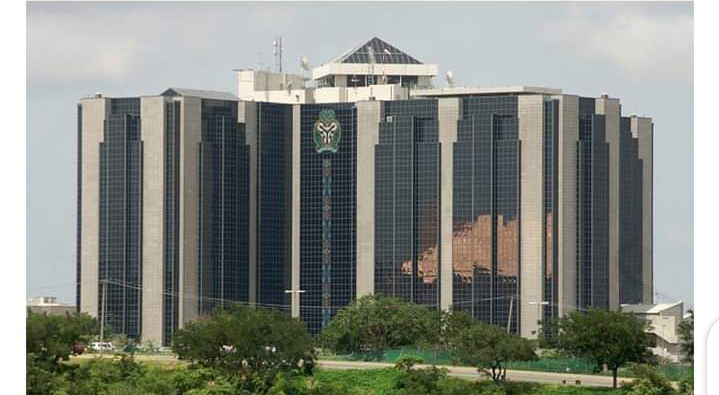

The Central Bank of Nigeria (CBN) has directed deposit money banks in the country to start charging 0.5% cybersecurity levy on some transactions done by their customers.
The apex bank gave the directive in a circular dated May 6, 2024 and sent to all commercial, merchant, non-interest and payment service banks as well as mobile money operators and payment service providers.
“Following the enactment of the Cybercrime (Prohibition, Prevention, etc) (amendment) Act 2024 and pursuant to the provision of Section 44 (2) (a) of the Act, ‘a levy of 0.5% (0.005) equivalent to a half percent of all electronic transactions value by the business specified in the Second Schedule of the Act’, is to be remitted to the National Cybersecurity Fund (NCF), which shall be administered by the Office of the National Security Adviser (ONSA),” the circular partly read.
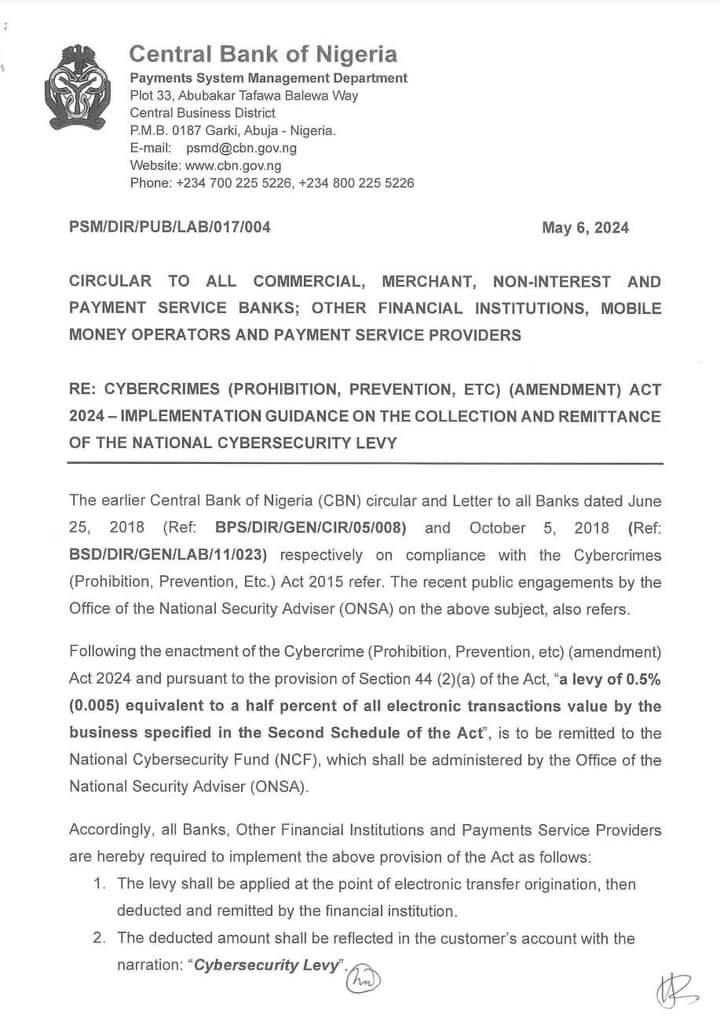

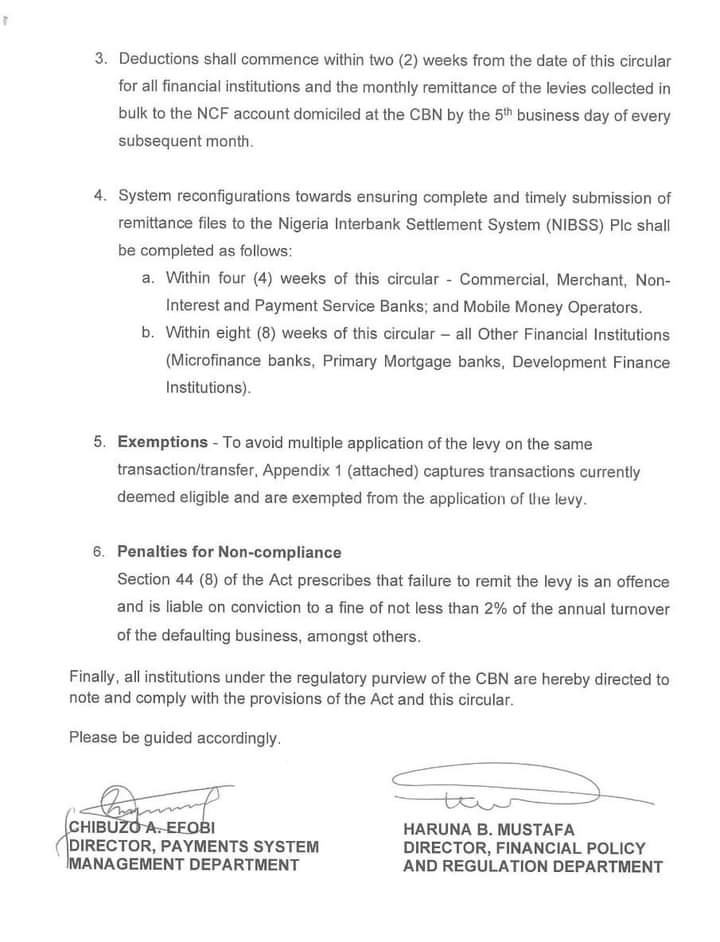

The apex bank said that the implementation of the levy would start two weeks from the date of the circular.
“The levy shall be applied at the point of electronic transfer origination, then deducted and remitted by the financial institution. The deducted amount shall be reflected in the customer’s account with the narration, ‘Cybersecurity Levy’. Deductions shall commence within two weeks from the date of this circular for all financial institutions and the monthly remittance of the levies collected in bulk to the NCF account domiciled at the CBN by the fifth business day of every subsequent month,” the circular said
The apex bank added that this new levy will not be applied on transactions such as loan disbursements and repayments, salary payments, intra-account transfers within the same bank or between different banks for the same customer, intra-bank transfers between customers of the same bank.
Also exempted from the levy were inter-branch transfers within a bank, cheque clearing and settlements, Letters of Credits, Banks’ recapitalisation-related funding only bulk funds movement from collection accounts, savings and deposits including transactions involving long-term investments, among others.
This current implementation however is not sitting well with some netizens as they reacted to the new development.
Here were some of their reactions from X.
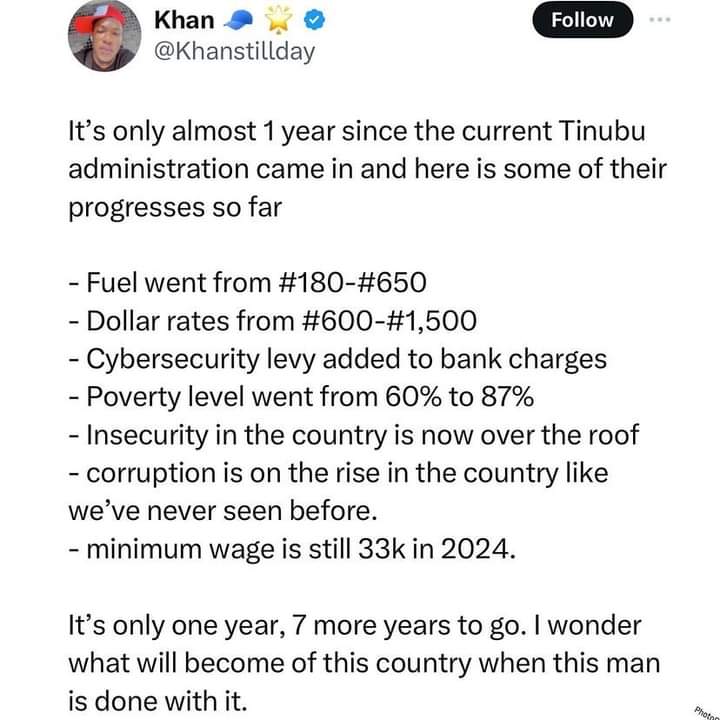

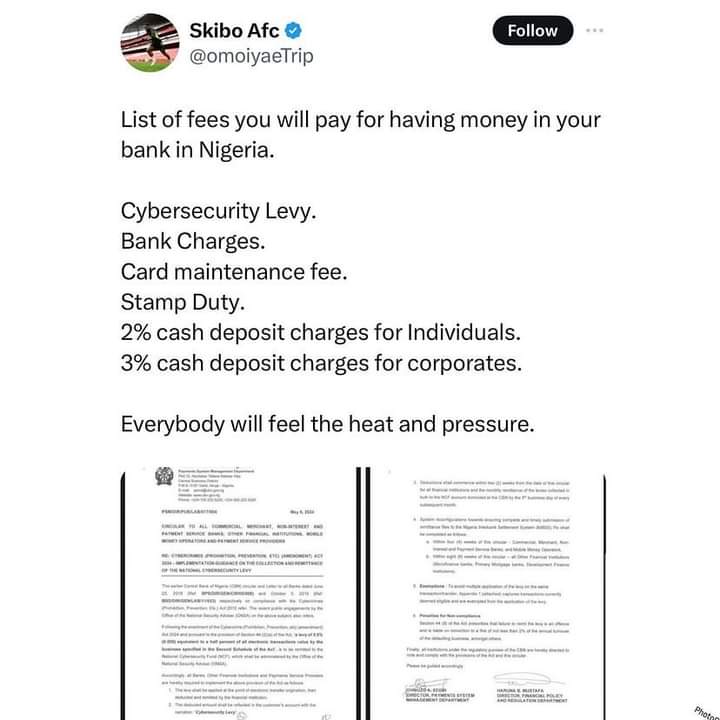

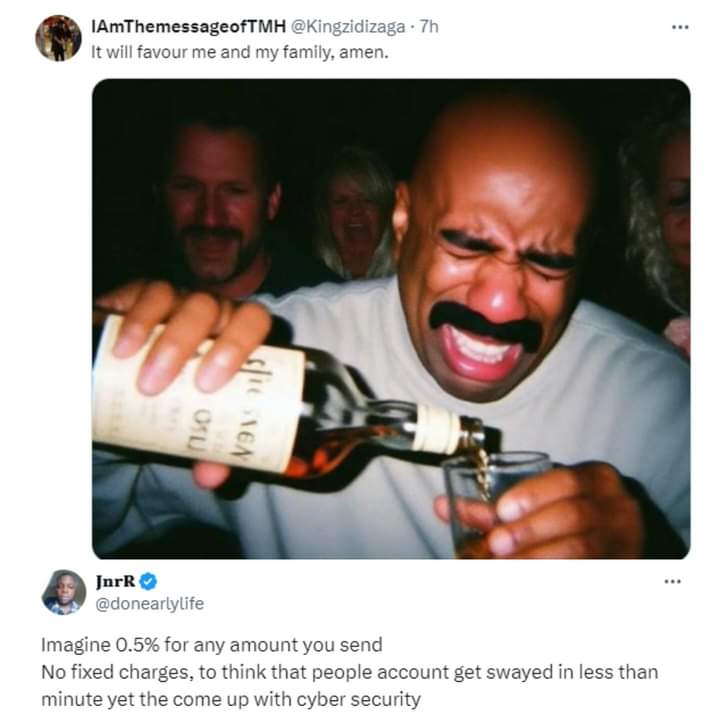

Finance
EFCC Chairman Tasks Nigerian Youths Against Crimes And Fraudulent Acts


The Chairman of Economic Finance Crime Commission (EFCC), Ola Olukoyede, has stressed the need for Nigerian Youth to see themselves as agents of positive change that have a lot to contribute to the socioeconomic development of the Nation.
Speaking at the 2nd edition of a Leadership Trainings Programme in Abuja, Olukoyede, who was represented by the Head Enlightenment and Re-orientation unit, (EFCC), Aisha Mohammed, said the commission’s dream is to see the youth contribute meaningfully to the society, emphasizing on the need to work together in bringing positive change to society.
The Economic and Financial Crimes Commission Boss declared the readiness of his agency to work with all Stakeholders, including the youth towards changing the narrative and reposition the country to greater exploit.
Also speaking, the representative of the Executive Secretary of Tertiary Education Trust Fund (TETFUND), Sonny Echono, appealed to the youths is to eschew social vices that could deter their full potential in life.
Other speakers at the event, including the Chairperson, Zero Tolerance for Social Immoralities Initiative (ZEITI) Africa, Rasak Jeje called on all stakeholders to join hands in collective pursuit of empowering new generation of leaders to curb the rising tides of social Vice among Nigerian youths.
The Chairperson, Zero Tolerance for Social Immoralities Initiative (ZEITI) Africa, Rasak Jeje made the call while addressing journalists at the 2nd edition of it Leadership Trainings Programme in Abuja on Thursday.
He said the training was aimed to intimate students leaders with knowledge and insights that will help them drive positive change and become exemplary leaders in their respective spheres.
Finance
AISA Has Refunded The Fees Paid By Yahaya Bello To EFCC


The Economic and Financial Crimes Commission (EFCC) says the American International School Abuja (AISA) has refunded the fees paid by the immediate past governor of Kogi state, Yahaya Bello, for his children attending the school.
In response to a letter addressed to the Lagos zonal commander of the EFCC, the school said $845,852 was paid in tuition “since the 7th of September 2021 to date”.
AISA said the sum to be refunded is $760,910 because it had deducted educational services already rendered.
“Please forward to us an official written request, with the authentic banking details of the EFCC, for the refund of the above-mentioned funds as previously indicated as part of your investigation into the alleged money laundering activities by the Bello family.
Since the 7th September 2021 to date, $845,852.84 (Eight Hundred and Forty-Five Thousand, Eight Hundred and Fifty Two US Dollars and eighty four cents) in tuition and other fees has been deposited into our Bank account.
We have calculated the net amount to be transferred and refunded to the State, after deducting the educational services rendered as $760,910.84. (Seven Hundred and Sixty Thousand, Nine Hundred and Ten US Dollars and Eighty Four cents).
No further additional fees are expected in respect of tuition as the students’ fees have now been settled until they graduate from ASIA.”
In a chat with The Cable, the spokesperson of the EFCC, Dele Oyewale, confirmed that the school has refunded the money.
‘’The money has been paid into public account,” Dele Oyewale was quoted as saying
-



 Politics4 days ago
Politics4 days agoPresident Tinubu Bans Purchase Of Petrol-dependent Vehicles By FEC Members
-



 Entertainment2 days ago
Entertainment2 days agoWhy I’m Not Ready For Kids – Singer Burna Boy Reveals
-



 News4 days ago
News4 days agoMath Teacher Accused Of Having Sex With 2 Students And Getting Pregnant For One Tearfully Reveals The Baby Was Taken Away From Her
-



 Entertainment3 days ago
Entertainment3 days agoMen Of The Lagos State Police Command Have Arrested Singer Portable
-



 News2 days ago
News2 days agoThe Peruvian Government Has Officially Classified Transgender, Nonbinary And Intersex People As “Mentally ill”
-



 GROpinion2 days ago
GROpinion2 days agoExposing the Malicious Sabotage of MoMo PSB Project in Enugu Ezike






